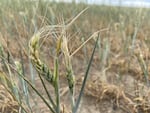Northwest farmers are pouring on the water to moisten soils ahead of the triple-digit temperatures and possible record highs expected this weekend.
As the temperature climbs, Drex Gauntt in Washington’s Walla Walla County has some baby sweet corn he’s pretty worried about.
“We’ve got little green shoots that all stand in nice neat bright green little rows, they’re about two inches tall,” Gauntt told the Northwest News Network on Wednesday.
Gauntt says he has crews checking irrigation pivot sprinkler heads and taking soil moisture readings in every field. But it’s hard to keep ahead of the water when new plants’ roots are so shallow.

Wheat at the farm of Nicole Berg in Washington's Horse Heaven Hills shows signs of a drought in May 2021, with a damaged curled head.
Anna King
“Their root structure is probably in the neighborhood of two-to-two-and-a-half inches deep right now. And so this hot weather can make this top layer of ground in a big hurry,” Gauntt said.
The farmer has set up water stations and has asked everyone to watch their fellow workers for signs of heat exhaustion.
Across the region, wheat crops were already suffering from drought before this weekend’s heat wave across the West and upper Midwest.
When wheat plants are stressed, they stop making grain. This heat wave is most likely going to reduce the numbers of kernels of wheat produced and shrivel many of the wheat berries making them lighter weight, according to USDA wheat expert Craig Morris, based in Pullman. Morris says that likely means less of a crop than normal.
“I think three-quarters is probably pretty realistic from what I’m hearing,” Morris said. “But again, until the combines roll and the trucks get filled up and go across the scales, and go to the elevator, you know we aren’t going to know for certain.”
Wheat farmer Nicole Berg, who farms in Washington’s Horse Heaven Hills, says there’s another problem with the near 113-degree weather that’s expected early next week during bluegrass harvest.
“I don’t think we’ll run the machines,” Berg said. “You know cause it’s too hot for the combines, you’ll start breaking belts — they’ll melt.”
Heat can also raise the protein in the crops. That makes an undesirable consistency in Japanese sponge cakes. Much of the Northwest’s grain is sold to the Philippines, Japan and Korea for confections and noodles.
